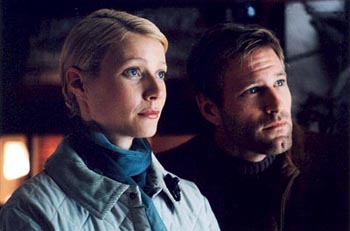![[Metroactive Music]](/music/gifs/music468.gif)
[ Music Index | Silicon Valley | Metroactive Home | Archives ]
 Photograph by David Appleby White-Scholar Workers: Gwyneth Paltrow and Aaron Eckhart track down an epistolary mystery in 'Possession.' Purloined Letters 'Possession' revels in the passion of two-fisted literary criticism THE NOVELIST Balzac claimed that there were only two paths to success: a man must burst through his fellow men like a cannonball or else sneak around them like a disease. A.S. Byatt's 1990 novel, Possession: A Romance, indicates that the twin methods are just as true in the world of academia. Byatt tells the story of a couple of scholars--a provincial English professor named Maud Bailey and Roland Michell, a poor, depressed underling to a British Museum annotator. The two discover a cache of ardent love letters between the eminent Victorian poet Randolph Henry Ash and the rarely read narrative poet Christabel LaMotte. (LaMotte and Ash are more or less based on Alfred Lord Tennyson and Christina Rossetti.) Proof of an affair between the two will be an academic bombshell, disrupting the common belief of Christabel's happily lesbian life and Ash's long, blameless marriage. And yet Maud and Roland must be stealthy about their discoveries, since they have rivals with big checkbooks who can snatch up the material and publish it for their own. "Literary critics make natural detectives," Bailey says. Possession is an engaging detective story that ends with literal grave robbery; the novel satirizes the contemporary lust for literary bones instead of the storytelling spirit itself. The novel was plainly a bear to adapt for film. Easy it must have been to discard Byatt's faux-Victorian verse, which goes on for pages. (I had enough trouble trying to finish Rossetti's "Goblin Market," and I've only read scraps of Tennyson, so bear that in mind when I complain.) Still, the film of Possession shows too clearly the three sets of screenwriting hands that worked on it, with subplots left in "revenant" ("ghost," to use a word Byatt uses) form. We don't always understand the fury behind some of the confrontations, such as in a scene where Christabel rebukes her cousin in France. There are stubs left that should have been pruned completely. Yet director Neil LaBute of In the Company of Men and Nurse Betty--who has been anything but delicate in his past films--has shaped the story to its essence: the rhymed pair of reluctant romances. The weaving together of past and present material is seamless because much of the film takes place in those buildings and forests in northern England where time has stood still. In the most fetching effect in Possession--in the most fetching effect in any of LaBute's films--a couple from 1985 will leave a room, and a couple from 1855 will enter it. LaBute's moralizing, his suspiciousness of sex and his distrust of love affairs suit Byatt's material perfectly, just as these qualities make his contemporary films seem Victorian. LaBute also boasts excellent pictorial values--even when I find his characters inhuman, the settings are always well thought out: the chrome and glass trappings of business traveler's America in In the Company of Men or the stuffy-looking ghetto for hip young Midwestern professionals in Your Friends and Neighbors. Unfortunately, the casting of Eckhart as Michell (the part is rewritten to make him an American) is the film's deepest flaw. Eckhart, muscled like an action hero, doesn't look like a man who lives in the world of books, or a man with a romantic past so painful he can't talk about it. As Maud, Gwyneth Paltrow--well, who could have carried off Maud, "all unmeet for a wife" ("unmeet" means unsuited, to spell out the allusion to Tennyson's Maud). You'd need a cross between the Ealing comedian Joan Greenwood and the young Glenda Jackson. Watching Paltrow here is like watching her in so many films. For the sake of the movie, you'll go along with it. As always, I was pestered with the thought that someone else would be so much better. It's not unfair to think about Paltrow that way. Dissatisfaction with an actress is like love's dissatisfactions. Everyone's been in a relationship in which he or she has thought they could be happier with someone else. That discontent doesn't mean they have to specify who that someone else could be. However, the Victorian lovers are just right: Christabel is played by Jennifer Ehle, mostly a stage actress, very delicate and yet not insipid. Jeremy Northam makes a dashing, ironical Ash. And throughout the film, LaBute follows Byatt's lead. Possession harmonizes the sexual terrors of two Victorian lovers fearful of what society will do to them with Bailey's own post-feminist misery. Her terror is explained in the title: she's afraid of being just a pretty possession in a man's world. LaBute has carried off what didn't work in the film of The French Lieutenant's Woman, a similar tale, similarly filmed, but a failure. LaBute, usually a literary bombardier, crept around his subject here and succeeded.
Possession (PG-13; 102 min.), directed by Neil LaBute, written by David Henry Hwang, Laura Jones and LaBute, photographed by Jean Yves Escoffier and starring Gwyneth Paltrow, Aaron Eckhart, Jeremy Northam and Jennifer Ehle, opens Friday at Camera 7 in Campbell.
To contact Richard von Busack: rvonbusack at metronews dot com Send a letter to the editor about this story via email . [ Silicon Valley | Metroactive Home | Archives ]
|
From the August 15-21, 2002 issue of Metro, Silicon Valley's Weekly Newspaper.
Copyright © Metro Publishing Inc. Metroactive is affiliated with the Boulevards Network.
For more information about the San Jose/Silicon Valley area, visit sanjose.com.